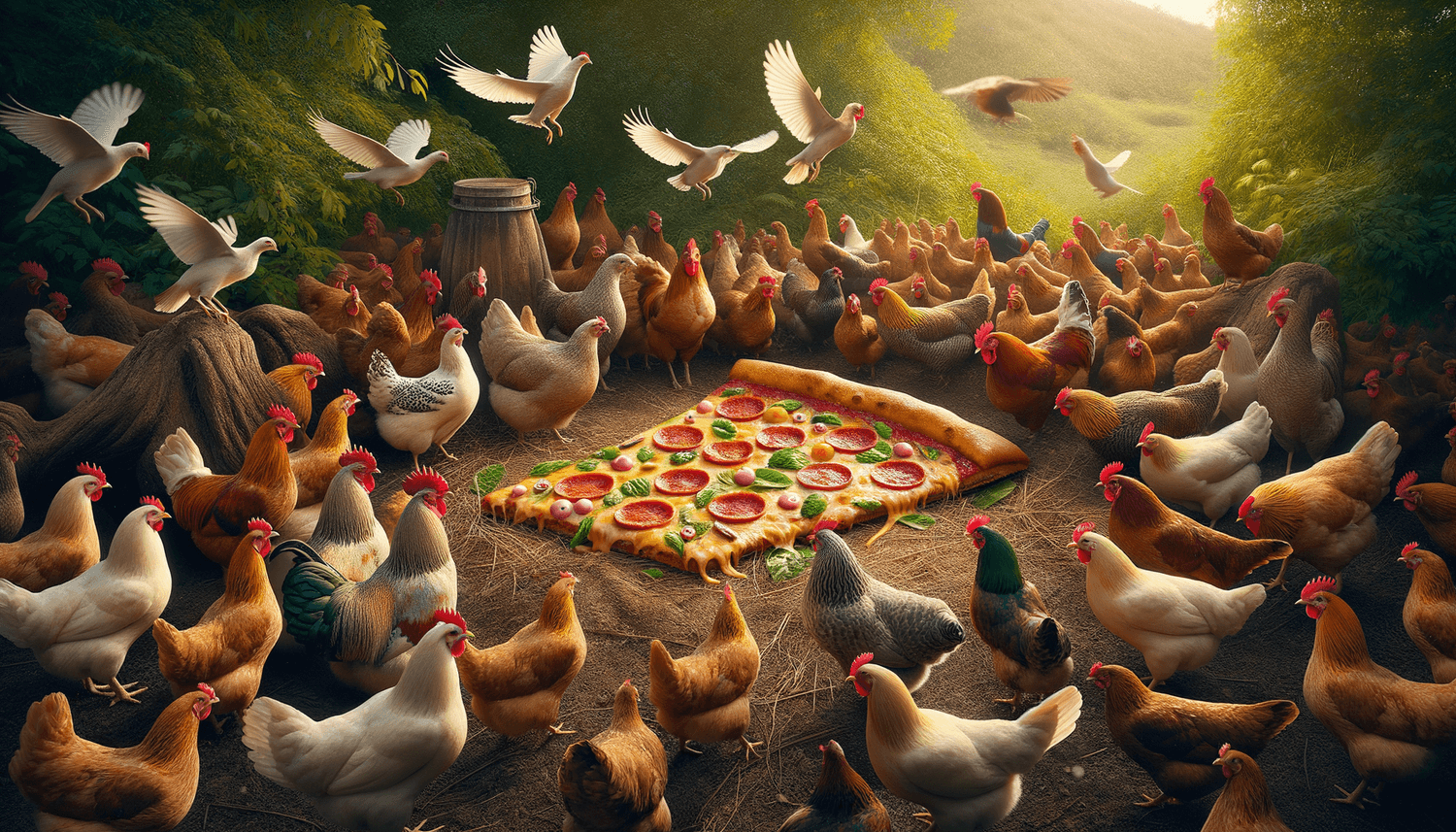Attention chicken lovers and pizza fanatics! If you’ve ever wondered, “Can chickens eat pizza?” – this fun-filled and informative blog post is perfect for you! Today, we’ll discover if our feathery friends can indulge in a slice (or two), while also considering the importance of a balanced diet. So, let’s dive into the saucy world of pizza and backyard chickens by exploring potential benefits, risks, nutritional value, and even some tips on how to prepare this scrumptious treat for your clucking companions.
Can chickens eat pizza?
Yes, chickens can eat pizza, but only in moderation. Pizza, while not toxic to chickens, should be given as an occasional treat due to its relatively high levels of fat, salt, and refined carbohydrates. A balanced diet is crucial for chickens to maintain good health, so it’s best not to offer them pizza too frequently.
A balanced diet for backyard chickens
Just like humans, chickens require a balanced diet to maintain good overall health and well-being. Despite their enthusiastic and voracious eating habits, not all foods are suitable for these delightful birds. A chicken’s diet should primarily consist of high-quality chicken feed, which provides the essential nutrients they need to thrive.
Chicken feed should make up around 80-90% of their diet, as it is specifically formulated to meet their nutritional needs. The remaining 10-20% of their diet can consist of healthy treats like fruits and vegetables, which act as supplemental sources of vitamins, minerals, and other beneficial nutrients. By paying close attention to what goes into your flock’s daily meals, you’ll be better equipped to help your chickens lead happy, healthy, and hearty lives!
Nutritional value of pizza for chickens.
While pizza isn’t an ideal food choice for chickens, it does contain some nutrients that can be beneficial to them when consumed in moderation. The crust of the pizza, typically made from wheat flour, can provide a source of carbohydrates, which are necessary for energy production. However, as the crust contains refined carbohydrates, it is not the healthiest option for chickens and should be limited.
Pizza toppings also contribute to its nutritional value. Cheese, for example, contains protein and calcium, which helps with muscle development and maintaining strong bones. Vegetables like tomatoes, bell peppers, and onions provide an array of vitamins and minerals but should be offered in smaller quantities due to their presence on the pizza. Similarly, small amounts of meat toppings can offer protein for chickens, but might also include higher levels of fat and salt, which are not ideal components of their diet.
To sum it up, pizza should be thought of as a treat rather than a mainstay in the diet of backyard chickens. Its nutritional value comes primarily from a limited variety of toppings and the occasional use of whole-grain crust. While it may provide certain vitamins, minerals, and protein, the disadvantages such as unhealthy fats and high sodium content outweigh the benefits. Therefore, pizza should not be a frequent item in a chicken’s menu.
Nutrition table of pizza for chickens.
| Information | Description |
|---|---|
| Nutritional Value | Limited nutritional value, primarily from certain toppings and whole-grain crusts. Provides carbohydrates, proteins, vitamins, minerals, and fats. |
| Suggested Serving Size | Small amounts as an occasional treat, keeping it to a small slice of pizza or a couple of bites. |
| Safe Feeding Practices | Offer pizza in moderation, ensuring that it does not make up a significant portion of your chickens’ diet. |
| Preparation | Tear pizza into small, manageable pieces for your chickens to enjoy safely. |
| Potential Risks | High levels of unhealthy fats and sodium, as well as refined carbohydrates, can contribute to health issues and disrupted nutrition balance. |
| Hydration | Pizza does not significantly contribute to hydration, so ensure your chickens have access to clean water at all times. |
| Digestion | Chickens may experience difficulty digesting high-fat and high-sodium foods, leading to potential digestive issues. |
| Seasonal Availability | Pizza is readily available year-round, though its nutritional value and suitability for chickens remain limited regardless of the season. |
| Other Benefits | Aside from being an occasional treat, pizza does not offer substantial benefits to chickens’ well-being and overall health. |
Alternative treats for chickens
Although pizza can be given as a treat to your backyard chickens, there are healthier options available that provide more nutritional benefits. Offering a wide range of fruits, vegetables, and other nutritious treats can improve your chickens’ diet and overall health. Some great treat options to consider include:
- Leafy greens, such as kale, spinach, and cabbage
- Fruits like apples, berries, and watermelon
- Protein-packed insects, like mealworms and earthworms
- Whole grains, such as oats, barley, and quinoa
- Seeds, including sunflower seeds and pumpkin seeds
These treats offer a balance of vitamins, minerals, proteins, and fibers, which can contribute positively to your chickens’ well-being.
Considerations for feeding treats to chickens
Remember that treats should not replace a high-quality chicken feed, which remains the cornerstone of a chicken’s diet. When providing treats, it’s important to consider their nutritional impact on your flock. Some guidelines to follow when offering treats include:
- Never exceed 10-20% of their overall daily food intake with treats
- Introduce treats gradually, ensuring your chickens digest them properly
- Always maintain access to clean water during treat times
- Monitor your chickens for any potential adverse reactions to new treats
By following these recommendations, you can safely introduce a variety of treats to your chickens while maintaining their overall health and well-being.

















